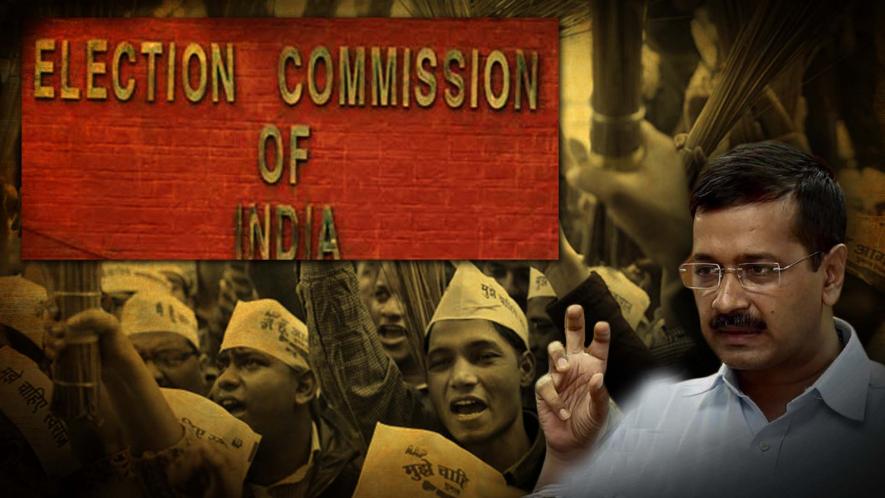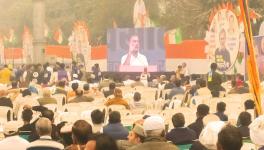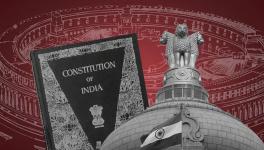How AAP’s 20 MLAs were Disqualified by Election Commission

Newsclick Image by Sumit
According to IANS, on January 22 the Aam Aadmi Party withdrew their petition before the Delhi High Court seeking a stay on the Election Commission’s decision from being submitted to the President. However, by the time the matter had come up for hearing, the President accepted the recommendations. The party filed a fresh petition on January 23 before a Division Bench headed by Justice S. Ravinder Bhat seeking that the notification be quashed. The matter has been listed for hearing on January 24.
The bare facts of the matter are that on March 13, 2015 the Government of Delhi had appointed 21 MLAs to the post of ‘Parliamentary Secretary’. A petition was subsequently filed in the Delhi High Court by Rashtriya Mukti Morcha challenging the appointments on the ground that the appointments were made without any communication to the Lieutenant Governor. On September 8, 2016 the High Court set aside the Order of the Government due to this irregularity. On June 19, 2015 a petition was submitted to the President by Prashant Patel, an advocate belonging to the Hindu Legal Cell. The petition sought the disqualification of the MLAs for holding an ‘office of profit’. This petition became the basis on which the Election Commission of India held the proceedings and passed the resulting Order and recommendation to the President.
The Order of the Election Commission of India disqualifying 20 AAP MLAs for holding offices of profit relied on established positions of law. The Order addressed five main issues which were dealt with in sequence.
On whether the respondent MLAs held the office of Parliamentary Secretary? The Election Commission held that the concerned MLAs had held the position of Parliamentary Secretary between March 13, 2015 and September 8, 2016, after the Delhi High Court had set aside their appointments. On whether the office of Parliamentary Secretary is an office under the Government, the Election Commission found that there was no law which had created the posts, and therefore no duties or functions were specifically mentioned. They were directed to work under the Ministers and in this regard, the Election Commission considered the existence of a conflict of interest. Whether the office of Praliamentary Secretary is an office which yields profit or has the potential of yielding profit? The Commission on this question found that since the Parliamentary Secretaries had received an official vehicle and office space, the office was one which yielded and was capable of yielding profit.
Whether the office of Parliamentary Secretary has an executive nature of functions? The Commission found that the MLAs who had been appointed Parliamentary were not only attending meetings but had also chaired meetings as well as taken policy decisions. Chairing meetings and taking policy decisions are done by the government and are therefore executive functions. Whether the office of Parliamentary Secretary can be said to be an un-exempted ‘office of profit’? On this question the Election Commission noted that the Delhi Government had attempted to pass a Bill which would have retrospectively exempted the MLAs from disqualification. This action in the eyes of the Election Commission was proof enough that the government considered the office of Parliamentary Secretary as an office of profit. The Commission also referred to Clause 4 of Article 239AA which limits the number of Ministers in the Delhi Government to 10 per cent of the strength of the Assembly. When the MLAs were appointed as Parliamentary Secretaries, it resulted in 40 per cent of the Assembly forming the Government, thus violating Article 239AA.
What is clear from the Order is that the 20 AAP MLAs did hold offices of profit, and as per the established case law, there is no doubt about their disqualification. However, AAP has alleged that the Election Commission did not allow the MLAs an opportunity to present their cases. In this regard the part concerning preliminary issues raised by the parties becomes relevant.
The Commission on September 28, 2017 sent a notice through a letter warning AAP that if they did not file their written replies, the matter would be decided without the said documents. The first issue raised by AAP was that the notice was given despite AAP having submitted their replies, the second part to this submission is that the materials can only be considered by the Commission if the Delhi High Court rejects their petition challenging the Orders of the Commission. The second contention was that the Delhi High Court had declared the appointments illegal and void and as the petition challenging the Order passed by the Commission was pending, the stage for filing written arguments along with documentary evidence had not been reached, and therefore it may not be required.
AAP also contended that the Commission’s Order on June 23, 2017 was sub judice and requested that the matter not be heard as it may be rendered futile if the High Court would decide in their favour. They also mentioned that the Commission through the same Order had already decided on the matter of maintainability and no hearing should take place till the matter can be decided properly. They also demanded the right to cross-examine the petitioner.
Due to the absence of a Court Order restraining the Election Commission’s Order in which AAP alleged that the Commission had unilaterally decided on the issue of maintainability, the Election Commission went ahead with the final hearing. The Election Commission also denied AAP’s demand to cross-examine the petitioner stating that the petitioner was a third party and had no locus standi in the matter. The Commission further stated that as the petitioner was not a witness, there was no need to conduct his cross-examination.
Get the latest reports & analysis with people's perspective on Protests, movements & deep analytical videos, discussions of the current affairs in your Telegram app. Subscribe to NewsClick's Telegram channel & get Real-Time updates on stories, as they get published on our website.
























